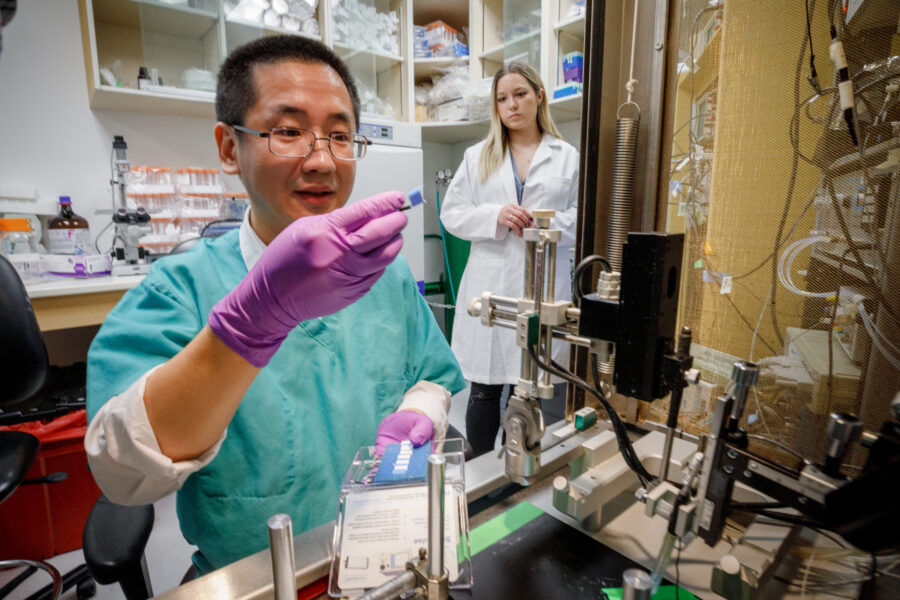When Hanjun Wang, MD, joined UNMC in 2007 as a postdoctoral fellow, he was driven by a simple spark: curiosity. Nearly two decades later, that spark has evolved into a passion that has propelled him into his newest role. Effective July 1, Dr. Wang will become vice chair of research in the UNMC Department of Anesthesiology.
Dr. Wang’s scientific journey began with a focus on cardiovascular physiology, particularly the mechanisms of heart failure and exercise intolerance. But over time, and with the encouragement of mentors like former department chair Steven Lisco, MD, his research expanded to include pulmonary physiology, lung injury and visceral pain. These areas, Dr. Wang said, are tightly interwoven with the department’s clinical mission, especially in critical care.
“I think of organs almost like individuals during a crisis,” he said. “The heart or lung compensates, overworks and eventually fails, like a society under stress. That’s how I approach my models. I draw insight from history, social systems, even art. Everything connects.”
Dr. Wang envisions a future focused on translational science, where discovery meets impact. His vision centers on building a robust pipeline that connects basic science to bedside application: identifying therapeutic targets, developing precise drug formulations and testing those treatments in preclinical and clinical settings.
A cornerstone of this vision is strategic collaboration. Dr. Wang, the Margaret R. Larson Professor of Anesthesiology, said he plans to harness campuswide expertise in pharmaceutical sciences and bioengineering to tackle unmet medical needs in anesthesia and critical care.
“We’re not chasing funding,” he said. “We’re chasing solutions. If you understand the mechanisms, the funding will follow.”
UNMC Department of Anesthesiology Chair Andrew Patterson, MD, PhD, said Dr. Wang’s goal for the next five years is to foster greater integration between basic research, education and clinical teams in the department as he succeeds Karsten Bartels, MD, PhD, in the role.
“Dr. Wang will enhance our translational research program and accelerate new drug discovery programs designed to significantly impact patient care,” Dr. Patterson said.
Dr. Wang’s commitment to solving clinical problems is highlighted in his innovative work in targeted drug delivery, aiming to reformulate existing pain medications to act locally and precisely, minimizing systemic side effects. It’s an approach that’s garnered multiple NIH grants and industry collaboration.
Dr. Wang said his goal is to create a research ecosystem or platform that supports investigators at every stage and from every background, whether they’re seasoned faculty or residents with a clinical question.
“If we build a strong network, then any idea, from any physician, can find the right collaborators and resources,” he said. “We want to make it easier to succeed, together.”
Dr. Wang said he credits his mentors for shaping his collaborative mindset. From the foundational guidance in physiology he received from UNMC’s Irving H. Zucker, PhD, to the leadership philosophies of Drs. Lisco, Bartels and Patterson, Dr. Wang said he has absorbed lessons in openness, fairness and leadership. Conversations with UNMC Vice Chancellor for Research Ken Bayles, PhD, he said, have further inspired him to think big.
He said he sees his role not just as building infrastructure, but as nurturing a culture, one where curiosity leads and success is measured not only in grants or publications but in impact.
Dr. Patterson said Dr. Wang is currently one of the most productive anesthesiology research faculty in the country. “Last year, he brought more than $2 million in federal research grants to UNMC, which made him the 17th most well-funded anesthesiology researcher in the United States,” he said. “In fact, if Dr. Wang were an anesthesiology department, he would be ranked slightly above Yale University (ranked thirty-fourth nationally) in terms of federal research funding.”
Outside the lab, Dr. Wang enjoys reading, especially history, drawing parallels between the past and the problems he tackles in science. He said fishing offers a rare moment of true relaxation, a chance to quiet his active brain.
“Science is not a burden for me,” Dr. Wang said. “It’s my hobby. I never lose my curiosity. Even on weekends, I find myself thinking about data, ideas. This is what I love.”
As Dr. Wang steps into his new leadership role, he is excited to build upon the strong foundation built by Dr. Bartels, saying “Under Dr. Bartels’ leadership, our research program now ranks in the top 20 nationally. That’s a great achievement for our department.”
“I don’t want to build success just for myself anymore,” he said. “It’s time to build something that helps everyone succeed.”
